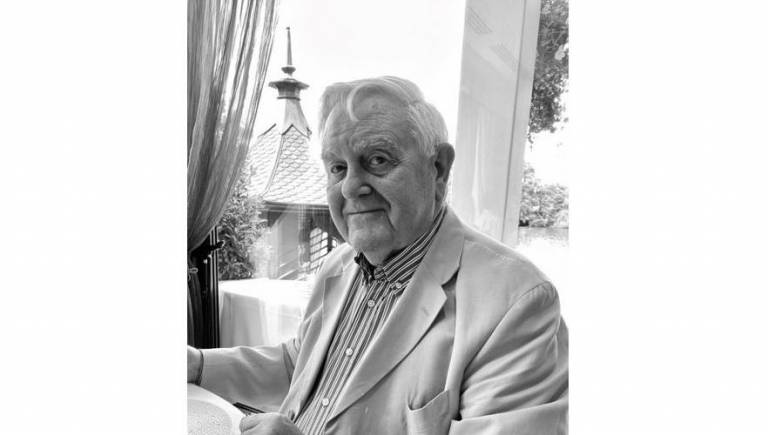Tributes paid to UCL visionary and moderniser Sir Derek Roberts
2 March 2021
Senior members of UCL’s community, past and present, have been paying tribute to Sir Derek Roberts CBE, FRS, FREng, who twice served as the university’s President & Provost.

Sir Derek, an industrial engineer and scientist, passed away in hospital last month, following a short illness. He served as UCL President & Provost from 1989 to 1999, before returning to the role from 2002 to 2003.
Prior to joining UCL, most of Sir Derek’s professional life had been spent in industrial scientific research, including as Deputy Managing Director (Technical) of GEC, the former electronics and defence business. He had been elected a Fellow both of the Royal Society and of the Royal Academy of Engineering for his material contribution in the invention and development of early semiconductor research. The fact that he was chosen by the UCL Council from a non-academic background was seen at the time as a “brave” decision – something that few would now question with hindsight.
Paying tribute to his former colleague, predecessor and long-time friend, Professor Sir Malcolm Grant, UCL President & Provost between 2003 and 2013, said Sir Derek was a transformational force.
“It was a troubling time in higher education when Sir Derek first joined UCL; the financial position needed improving and the research focus needed a new direction. He saw the need for modernisation and he was made of stern stuff. He brought industry experience and a northern bluntness, which proved to be exactly what UCL needed. Importantly, he took decisions, swiftly. He introduced 8am meetings, much to the astonishment of some; preferring often to sit in his shirtsleeves with a window open behind him, whilst others around the table shivered in their gloves, scarves and overcoats.
“He secured UCL’s proper share of government funding, and established a direct and transparent relationship with the funding council.
“He was passionate about UCL, and a profound believer in the university mission. His drive and hard work took us through one the most exciting times in our history, and left a remarkable legacy.”
Under his leadership the breadth of UCL’s research and academic portfolio expanded significantly, through some exceptional mergers and an ambitious programme of expansion.
UCL was joined by the School of Slavonic and East European Studies (SSEES) and by four formerly independent postgraduate medical institutes: the Institutes of Child Health, of Neurology, of Ophthalmology and the Eastman Dental Institute. He also oversaw the complex merger of the Middlesex Medical School and the Royal Free Medical School with the UCL Medical School. New virtual and physical centres of excellence in the medical sciences were formed and he was pivotal in persuading the Japanese pharmaceutical company Eisai, to invest in UCL as a sign of the historical links between UCL and Japan. These were the foundations of the globally leading biomedical establishment of UCL today.
Sir Derek retired in 1999. However in 2002, following the resignation of his successor Sir Chris Llewellyn Smith, Sir Derek was invited back to provide interim leadership pending appointment of a new Provost.
Lord David Young of Graffham, then chair of UCL Council, recalls: “I had the privilege of working with Derek Roberts when I first joined Council. Decisive, he knew what he wanted and was a pleasure to work with. He retired and when his successor retired early I called on him and without hesitation he agreed to return as Provost for 12 months, at a considerable personal cost. In those 12 months he calmed the ship and paved the way for Malcolm Grant to join us. I and the College will always be in his debt.”
Paying tribute, Professor David Price, Vice Provost Research at UCL, said: “Sir Derek Roberts was an inspirational and impressive leader. I had the pleasure of serving under Sir Derek as a Head of Department, and it would be fair to say that he taught me most of what I know about university politics and leadership. UCL was, in his day, a much smaller place, and I had regular “one to one” meetings with him. He would challenge strongly, but once convinced of an idea he would back it to the hilt. Often I recall asking for a resource, and then end up being told I should have asked for more, which was then added to shopping list, followed by a big tick and his initials.”
Dean of UCL Engineering, Professor Nigel Titchener-Hooker, said: “Sir Derek Roberts was an instrumental force who helped to propel engineering at UCL forward.
“I have particularly strong memories of his support for establishing the first Department for Biochemical Engineering in purpose-designed facilities adjacent to what is now our Student Centre.
“That vision was incredibly well judged and was characteristic of his way of working in identifying where UCL could demonstrate leadership. UCL named our major engineering building after Sir Derek, in recognition of his contribution. He was proud of his training as an engineer and enjoyed celebrating the success of a faculty he had personally done much to support.”
UCL President & Provost, Dr Michael Spence said: “The tributes from those who knew and worked with Sir Derek at UCL show how very much admired and loved he was.
“It is a rare and remarkable achievement to lead an institution like UCL on two separate occasions for a combined total of 11 years. This illustrates both his strong leadership skills and the love he had for our university.
“The legacy Sir Derek leaves behind is significant and helped UCL secure its position today as one of the world’s leading research universities and places to study.”
Sir Derek Harry Roberts CBE FREng FRS died on 17 February 2021 at the age of 88. He is survived by his wife, Lady (Winifred) Roberts, his two children and two grandchildren.
Image
- Credit: Sir Derek Roberts' family
 Close
Close

